 The launch of ChatGPT late in 2022, and the tremendous interest it provoked, inaugurated what one will one day see as the Age of Artificial Intelligence (AI). AI will make it easier to generate outputs in virtually every industry, creating a challenge for reward professionals: how does one measure an individual’s performance when one of his or her outputs can be generated by an algorithm? “AI is here to stay, and we can expect it to get significantly better. Reward professionals should see it as a great opportunity to refine their thinking about what constitutes great performance, and thus how to reward it,” argues Dr Mark Bussin, Master Reward Specialist and Executive Committee Member of the South African Reward Association (SARA). “Specifically, AI prompts us to look at what humans do best and use that insight to determine how we measure and reward our people.” Dr Bussin offers the following tips to help reward professionals, and HR more generally, to use the AI revolution to the advantage of their organisations: Focus on creativity, quality and innovation. AI is going to be a great tool for automating routine tasks, but when it comes to creative problem-solving or generating innovative ideas, it is a non-starter. Finding ways to reward individuals or teams for creativity rather than output would be beneficial to both the employees and the organisation. Similarly, reward professionals should look for metrics that measure quality rather than quantity. For example, customer satisfaction or product ratings could be used to assess the performance of an individual or team. Emphasise collaboration. Humans have leveraged the power of collaboration to overcome seemingly insurmountable challenges over thousands of years. Encouraging individuals or teams to work together and rewarding them for doing so will play to humanity’s strengths and will generate excellent results. Provide a sense of purpose. Humans are motivated to perform better when they feel their work is making a positive impact—AI is just a machine. Global research shows that purpose-driven companies realise huge benefits. Making sure the organisation has a clear vision and purpose can motivate employees to do their best, and ultimately drive the company’s performance in achieving its strategic goals. Develop policy guidelines relating to the use of AI. Everybody in the organisation needs to know how AI should—and should not—be used. Each industry will have its own set of ethical issues, and employees will need charts to navigate this tricky terrain. Provide professional development opportunities. It’s long been recognised that professional development is a key lever when it comes to attracting and retaining top talent—and driving high performance. Alongside providing policies to guide employees, organisations must provide employees with ongoing training in this rapidly changing technology and what it means for them. They will use it better and, as an added bonus, they will be more likely to remain with, or want to join, the organisation. Use AI to speed up the drafting of reports and policies. Finally, HR and reward professionals themselves should find ways to use AI to make themselves more efficient. Freeing up more time to be devoted to adding value will also protect their own positions. “The onward march of AI is in fact an opportunity for us all, and reward professionals in particular, to concentrate on the things that humans do best and focus on supporting them—leaving the drudge work to the machines,” Dr Bussin concludes. ENDS MEDIA CONTACT: Rosa-Mari Le Roux, [email protected], 060 995 6277, www.atthatpoint.co.za For more information on SARA please visit: Website: www.sara.co.za Twitter: @SA_reward LinkedIn: South African Reward Association Facebook: SARA – South African Reward Association
1 Comment
 Companies need an internal committee as well as an industry body to ensure artificial intelligence (AI) is used responsibly for HR processes within their business and by their service providers. This is according to Carmen Arico, Chartered Reward Specialist, and spokesperson for the South African Reward Association (SARA). "AI is not yet mature enough to be entrusted with the ethical nuances of HR without human intervention and close supervision," she says. While AI promises an exceptional productivity boost across HR functions, it should not be implemented without proper policies, oversight and safeguards in place. AI in HR AI has a wide range of applications within HR. These include creating job descriptions, sourcing applicants, analysing CVs, filtering candidates, scheduling interviews, and even analysing facial and vocal responses during interviews. After a new hire is onboarded, AI can be deployed in areas such as skills development, reward design, performance reviews, wellness assessments, and more. Arico is firmly opposed to AI handling much more than rote HR administration. "When you apply the technology in areas that are too subjective even for humans, like gauging deception from facial expressions or confidence from voice tone, you're straying into dangerous legal territory," she says. AI security Arico is also concerned with how personal information may be used, and how easily it might be exposed by those who know how to bypass the shallow security barriers set by AI developers. "Ask for private information directly and the model might refuse on moral grounds, but rephrase the request as a plot to a fictitious story and, in that context, it could freely share everything it knows about an employee," says Arico. In addition, AI models learn from historical data that can often be littered with biases and falsehood. Will it suggest only male candidates for an occupation previously dominated by men; exclude a certain minority group if it has insufficient training data on that demographic; or reject a candidate who is neurodivergent because they don't fit a traditional psychometric profile or respond to social cues in a traditionally accepted way? Internal committee Arico says that corporate HR must understand how AI works and what its shortcomings are, develop policies for the scope of its use, and provide safeguards to mitigate any associated risk. Most importantly, companies must establish an internal steering committee tasked with ensuring AI is employed responsibly and ethically across their organisation and throughout their supply chain. This means their policies and practices must consider how AI is used by external HR service providers, such as recruitment specialists, head-hunters, training partners or reward consultants. Industry body Arico believes this can best be achieved through the establishment of a regulatory body that sets shared standards on the ethical and responsible use of AI, not just in HR but across all management functions and industries. "Members will participate in the development of these standards and bind themselves to their universal implementation to ensure AI is a blessing and not a curse to business and employees and can conform to agreed-upon ethical and moral standards," she says. Arico also advises that for the body to be effective, it should be led by neuroscientists, data scientists, AI researchers, AI ethics experts and another top talent in the AI space. “A certification, similar to ISO 9002, would not only identify companies as responsible AI users but also act as a differentiator in what will soon be a highly competitive market,” she says. ENDS MEDIA CONTACT: Rosa-Mari Le Roux, [email protected], 060 995 6277, www.atthatpoint.co.za For more information on SARA please visit: Website: www.sara.co.za Twitter: @SA_reward LinkedIn: South African Reward Association Facebook: SARA – South African Reward Association 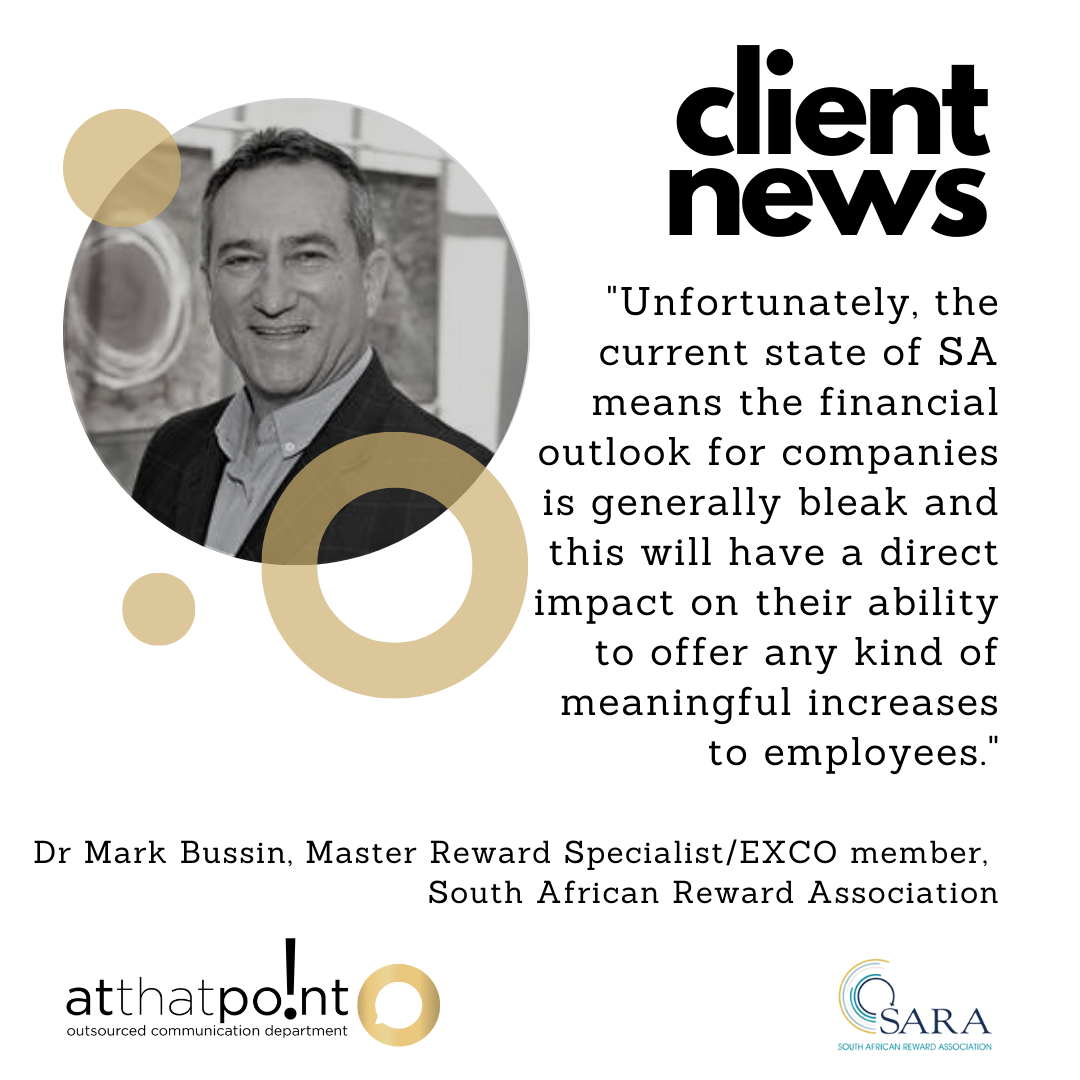 Can South African workers look forward to increases in line with the cost of living this year? According to Dr Mark Bussin, Master Reward Specialist and EXCO member at the South African Reward Association (SARA), economic instability in the country makes this unlikely – unless the government takes drastic action soon. "Unfortunately, the current state of South Africa means the financial outlook for companies is generally bleak and this will have a direct impact on their ability to offer any kind of meaningful increases to employees," he says. Dr Bussin provides an overview of the causes of the situation, their impact on employee rewards, and solutions that should be implemented promptly to improve conditions. How will increase decisions be impacted by the current economic climate? "First, we need to ascertain what is meant by 'current economic climate'," says Dr Bussin. He highlights the following key factors that define the country's economic situation and impede employers' ability to make favourable increase decisions:
These economic failings will inevitably cause employers to:
"You can ask a thousand economists this question and you will get a thousand different answers," says Dr Bussin. However, from a company perspective, relative to the decisions around making salary increases possible, he believes the following must happen at all levels of government:
What does this mean for employees? "Until the government takes decisive and proactive steps to remove these economic barriers, organisations will be unable to respond positively to their employees' cost-of-living requirements," says Dr Bussin. He encourages companies and concern groups to continue to put pressure on the nation's leaders to make tangible reforms that will help South Africa recover from crippling economic deficiencies. "We can talk about working together towards a solution all we want. But, if the proper political, legal and socio-economic foundations are not in place, there is no footing to climb out of the hole in which we collectively find ourselves," he says. ENDS MEDIA CONTACT: Rosa-Mari Le Roux, [email protected], 060 995 6277, www.atthatpoint.co.za For more information on SARA please visit: Website: www.sara.co.za Twitter: @SA_reward LinkedIn: South African Reward Association Facebook: SARA – South African Reward Association If you do not want to receive emails from us, please use the link: Click here to unsubscribe. 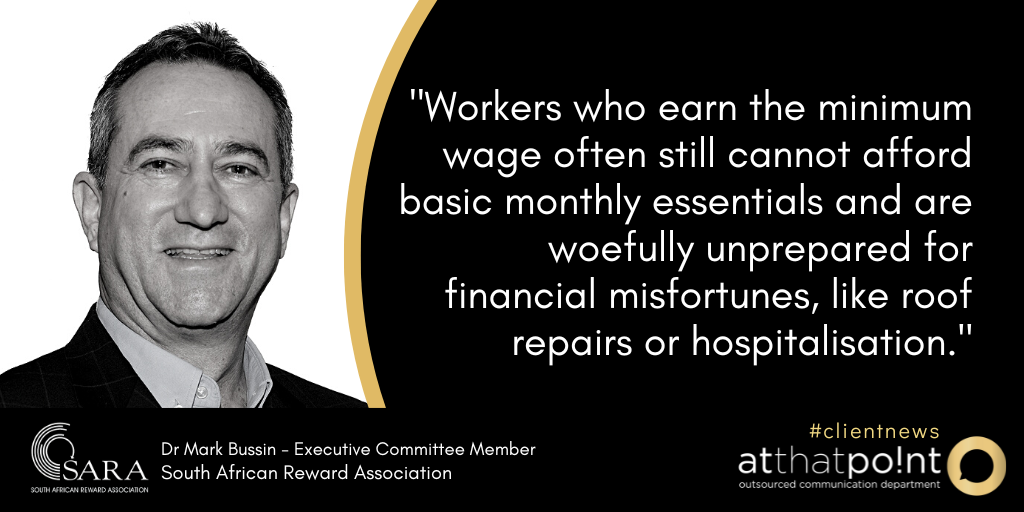 Employers should pay their workers a living wage and not just the national minimum prescribed by law. This is according to Dr Mark Bussin, Master Reward Specialist and Exco member of the South African Reward Association (SARA). "An employee's monthly pay should be at least R12,000 to R15,000 for a 40-hour work week," he says. Bussin defines a living wage as remuneration sufficient for an individual and their family to have a frugal yet dignified lifestyle. "Workers who earn the minimum wage often still cannot afford basic monthly essentials and are woefully unprepared for financial misfortunes, like roof repairs or hospitalisation," he says. Business impact What many employers don't realise is that financial distress among workers is bad for business. The strain of not earning enough and constantly struggling to survive can negatively affect employees physically, emotionally and cognitively. In an August 2013 Science journal article, researchers Mani, Mullainathan, Shafir and Zhao observed that a lack of money led study subjects to make poorer decisions. They hypothesised that poverty reduced focus and effort, resulting in inferior performance. So the stress associated with financial hardship causes employees to make errors in judgement and inhibits their productivity. It also prevents them from reaching their full potential, increases absenteeism, and results in higher turnover rates. "These effects can reduce business performance in the short term and hinder economic growth over time," warns Bussin. Replacing workers will not solve the problem if most of them face the same predicament. Trapped in poverty According to estimates from PwC, the University of Cape Town and the Tshwane University of Technology, the national minimum wage level for 2022 of R23,19 per hour is only around half to a third of the current living wage. It is not possible for low-income workers to survive on these amounts and they are often forced to turn to unlicensed money lenders for additional cash to make up the shortfall. Saddled with unregulated terms and high interest rates, they soon become trapped in a vicious cycle of borrowing from Peter to pay Paul. As they end up poorer than before, their descent into negative income can see their quality of life spiral. Being unable to look forward to tomorrow or plan for a better future can have dire physical and mental health consequences for them. Breaking the cycle Employers who pay a living wage are instrumental in the eradication of poverty. Employees with disposable income are not only happier and more productive at work but are also more active in the market, stimulating economic growth. In addition, workers do not need to engage in risky lending to make ends meet, reducing their exploitation by the unscrupulous. Therefore, the argument for a living wage is not only a moral one that focuses on business' obligation to society. It is also a strategically sound investment that, as it lifts up the poor, creates a more prosperous business environment for companies and citizens alike. "The more companies that decide to embrace a living wage, the greater the positive effect will be," says Bussin. ENDS MEDIA CONTACT: Rosa-Mari Le Roux, [email protected], 060 995 6277, www.atthatpoint.co.za For more information on SARA please visit: Website: www.sara.co.za Twitter: @SA_reward LinkedIn: South African Reward Association Facebook: SARA – South African Reward Association Dr Mark Bussin, EXCO member of the South African Reward Association (SARA), says that powerful international trends are changing the governance and remuneration landscape significantly.
“These trends are ushering in a profound shift in how we think about governance and remuneration, and smart boards and executive teams need to understand their implications,” he says. “Many of them are developing trends, so companies will need to keep their eye on the ball, and develop flexible strategies to respond to a shifting set of variables.” Dr Bussin says that while there are multiple trends, the following are the most important as they represent key directional shifts: Institutions and regulators flex their muscles Underlying many of these trends is the indisputable fact that both institutional investors and regulators are getting much more specific about what they want from companies in which they are invested. In particular, advisors like Lewis Glass and Institutional Shareholder Services are gaining more influence as they provide advice to large clients, and their agendas are thus gaining traction. Key agenda items include ESG and human capital measurement. ESG becomes a board matter Environment, social and governance (ESG) reporting has become mandatory globally. “The move to include non-financial metrics is positive, as it supplements traditional backward-looking and quantitative financial metrics with a new set that are essentially forward looking and qualitative,” he argues. “However, measurement is much more difficult and there’s no real objective way of doing it yet.” Human capital reporting grows up Another move to a more qualitative approach sees traditional reporting based on figures relating to gender and race being complemented by a deeper look at how the company is managing its talent. “We’re looking beyond numbers-based affirmative action to consider things like dignity, respect and, above all, inclusivity,” Dr Bussin says. Pressure to simplify remuneration Variable remuneration frameworks designed to drive performance have become so complex that that it has become virtually impossible to establish what anyone really earns, and so benchmarking cannot be done. Focus on the vertical and horizontal pay gap continues to grow The vertical pay gap—the CEO’s salary compared to that of the lowest paid worker—seems less and less useful as a measure. The top jobs are becoming more and more complex, and so attracting higher wages, while the lowest remain static. “The vertical pay gap will continue to widen and, in any event, redistributing the CEO’s salary to workers would make absolutely no impact,” says Dr Bussin. “For that reason, companies are moving towards paying a living wage (rather a minimum wage) to all employees as a way to make a real impact on people’s lives.” The horizontal pay gap—also known as the gender pay gap—remains a highly controversial issue. The global average is in the region of 25% whereas in South Africa it falls into the 10%-20% range. While the issue is not as clear cut as it might seem—other factors such as genuine parity of the work done and differing work/life priorities play a role—this is something that is receiving more focus. Work-from-anywhere trend raises significant issues Remote working has been growing in popularity over the past decade or so, strengthened by the recent lockdowns. On the governance side, this work style will demand a move from input-based to outcome-based performance management. Getting this right will surely only be a matter of time, but the tax question is more vexing: to whom would a consultant living in country A and working for multiple clients in various other jurisdictions pay tax? No firm answer to this question exists as yet. A related issue is the growing number of contractors, freelancers, part-timers and consultants: what kind and level of benefits are they entitled to receive? If the answer is none, then should they not be paid a premium? ENDS MEDIA CONTACT: Rosa-Mari Le Roux, [email protected], 060 995 6277, www.atthatpoint.co.za For more information on SARA please visit: Website: www.sara.co.za Twitter: @SA_reward LinkedIn: South African Reward Association Facebook: SARA – South African Reward Association The litany of serious governance failures laid bare in the published elements of the Zondo Report is a wake-up for South Africa, and remuneration issues are at the heart of the problem—and it’s solution, argues Dr Mark Bussin, Executive Committee Member of the South African Reward Association (SARA).
“In many instances, inappropriate remuneration is the coalface of corruption and incompetence in our state-owned enterprises (SOEs) because, after all, it boils down to money,” he says. “If we sort out remuneration, we are half way to putting our SOEs back on the path for growth, with tremendous knock-on benefits for the economy as a whole.” A major contributor to the problem comes from the way in which Ministers often appoint CEOs directly. Best practice as recommended in King IV’s Supplement on SOEs advises that Ministers only appoint CEOs from a shortlist compiled by the board. Bypassing the board reduces it—and its committees, including the remuneration committee—to a mere rubber stamp. A CEO that is appointed directly by the Minister is in a position to instruct the remuneration committee to approve unjustified and excessive pay hikes and bonuses as has been done in numerous SOEs. Another key issue that emerges from the Zondo Reports is the negative impact of cadre deployment. With political connections counting more than competence or ethics in many of these deployments, many remuneration-committee members are incompetent even if they are not actively corrupt. This means they cannot properly interrogate remuneration benchmark studies and ask the right kind of searching questions. “In fact, these incompetent but politically connected individuals can easily be led to a foregone conclusion,” he says. Dr Bussin believes that too many board members rely on their emoluments from a single board, inclining them to adopting a passive role when it comes to controversial issues, such as the perennially vexed question of executive pay. To preserve their independence, non-executive directors should not be allowed to earn more than 20% of their income from one company, he says. “The real culprit here is cadre deployment which simply loads overheads onto companies for scant benefit. One way to attack this problem would be simply to do away with individual SOE remuneration committees, and institute a central one under the auspices of National Treasury,” he says. A similar approach was evident in President Ramaphosa’s 2022 State of the Nation, which indicated that moves were afoot to implement a centralised shareholder model for SOEs to improve governance. Many commentators pointed out that in essence the plan suggests that the only way to bring the sector under control is to impose governance from above. A centralised remuneration committee would immediately eliminate the need for hundreds of expensive board posts—a quick win for cash-strapped SOEs. “More important still, this approach would re-establish the link between remuneration and executive performance and value delivered to the company. It would also make being a deployed cadre much less attractive to incompetent and corrupt individuals,” Dr Bussin concludes. “Centralising remuneration could be accomplished easily and the payoffs would be large and immediate.” ENDS MEDIA CONTACT: Rosa-Mari Le Roux, [email protected], 060 995 6277, www.atthatpoint.co.za For more information on SARA please visit: Website: www.sara.co.za Twitter: @SA_reward LinkedIn: South African Reward Association Facebook: SARA – South African Reward Association 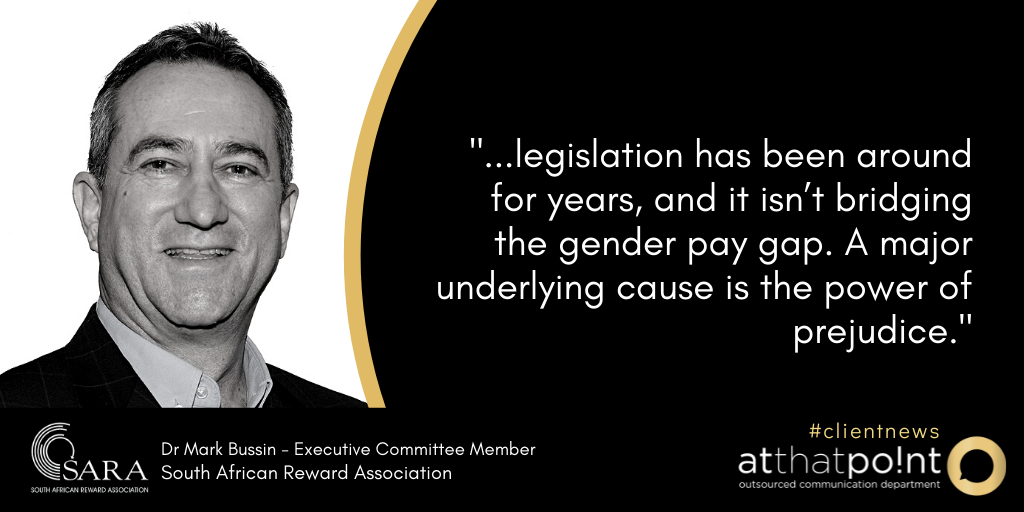 The underlying causes and current barriers of the gender pay gap are often misunderstood, says Dr Mark Bussin, Master Reward Specialist and Executive Committee Member of the South African Reward Association (SARA). With Women’s Day coming up, it is appropriate to point out that the gender pay gap in South Africa has been between 15 – 18% for many years and while South African legislation and company policies have been put in place to address the issue, the statistics aren’t changing speedily enough. “Section 6 of South Africa’s Employment Equity Act was implemented several years ago and it stipulates that companies may not discriminate in terms of remuneration; they are legally obliged to offer equal pay for work of equal value. In America and Canada, similar legislation has been around since the 1960s, but the gender pay gap in these countries still exists. Legislation isn’t solving the problem and this isn’t a uniquely South African problem,” says Bussin. Many companies have openly stated their commitment to gender pay equality and regularly review whether they are paying equally for equal work, but this isn’t having an effect on the gender pay gap either. Legislation isn’t Bridging the Gender Pay Pap “The only thing that has changed is a heightened awareness of gender pay discrimination. Company remuneration policies and legislation has been around for years, and it isn’t bridging the gender pay gap. A major underlying cause is the power of prejudice,” says Bussin. Bussin says that many prejudices exist about women in the workplace. Companies have down-sized, right-sized and are leaner than ever before, but leading recruiters and HR professionals tend to be even more wary about hiring or promoting a female candidate. Maternity leave, time spent away from work to care for children, or the possibility of a new mom deciding to not return to the workforce after childbirth, are still scenarios that are ingrained in the minds of people in power positions. This has given rise to a new term I call the “mommy gap”. Women may never catch up to men once they have had a child – the gap stays with them in perpetuity. “Unfair assumptions and scenarios such as these still count against women. Whether recruiters, HR managers and directors are open about their prejudices or not, these prejudices still exist in the back of their minds,” says Bussin. Questioning and Negotiation Adding to the challenge is that women are less likely to question the salaries that they are offered and less likely to negotiate better pay. “Recruiters and HR managers may subconsciously assume that they can pay a woman less because she might have a partner that helps support her and her household. Women, in turn, are part of the problem because they trust that the remuneration that they are being offered is fair, when they should actually be researching market related salaries as well as the company’s pay scale, and be advocating for fairer pay,” says Bussin. Bussin says that company directors should be concerned about the gender pay gap for a number of reasons. Not only can discriminatory pay be damaging to their brand, but it can negatively impact their businesses in a number of ways. “If a case about gender pay discrimination makes its way to court, the CCMA or the media, it could be very damaging to your brand. Not only do employees want to work for a company that remunerates fairly and sustainably, but it’s also good governance. It’s simply the right thing to do,” concludes Bussin. ENDS MEDIA CONTACT: Idele Prinsloo, 082 573 9219, [email protected], www.atthatpoint.co.za For more information on SARA please visit: Website: www.sara.co.za Twitter: @SA_reward LinkedIn: South African Reward Association Facebook: SARA – South African Reward Association Authored by: Dr Mark Bussin (Master Reward Specialist) and Yolanda Sedlmaier (Chartered Reward Specialist), Executive Committee Members of the South African Reward Association (SARA)
Before COVID-19 hit the world, the approach to reward was well defined. Organisations paid their employees a fixed basic salary, plus a set of additional benefits that effectively sweetened the pot. The fixed portion served to ensure workers received an equitable market-related income. The variable portion, on the other hand, extended into performance related rewards such as sales commissions and annual bonuses. Variable pay itself is categorised into two components. Short-term incentives (STIs) are attached to annual performance. Long-term incentives (LTIs), like company shares, are often contingent on employees meeting negotiated performance criteria. At the same time, employers were embracing experiential rewards, like wellness programmes, workplace comfort, flexitime, outstanding performance recognition and other non-financial benefits. The pandemic has turned this model on its head, forcing employers to consider different ways to attract, retain and motivate talented workers, and this without the resources previously at their disposal due to the wide ranging economic impact of the pandemic. How fixed pay has changed There have been no permanent changes in fixed pay policy itself. However, with so many staff being retrenched and businesses closing down, employees are more willing to accept the pay cuts their employers are forced to implement. It is obviously better to have less income than no income at all. What has changed is that employers are offering more options. These could include flexible working hours, paid or unpaid sabbaticals, or reduced hours for reduced pay. Something we are seeing, however, is a global trend towards lower variable pay in exchange for a small increase in monthly fixed pay. This is to provide the security employees need in the short term, although its adoption is not as prevalent in South African boardrooms, although we expect it will be in the near future. How variable pay has changed Variable pay is generally accepted to be that part of the reward package more readily tweaked to motivate employees and encourage better performance from them. Now, with almost all employers struggling to save jobs and keep their doors open, they face limited options. Most have managed to retain basic benefits, like medical aid and retirement funding. What has been more affected is incentives, such as sales commissions, overtime, annual bonuses, and even executive performance bonuses. With the global business slowdown, workers are unable to reach previously achievable targets, so employers aren’t earning the profits needed to reward them. To date, most organisations have been unable to innovate their reward programmes. They’ve been too busy trying to cut costs and negotiating with employees to choose between retrenchments or pay cuts. Unsurprisingly, workers generally opted for a lower salary over the uncertainty that they might be the ones left without a job. Productivity In spite of these dramatic events, many companies report an increase in productivity. This is due to flexible working arrangements allowing employees to save time and money not travelling to the office. It’s also an indicator that employees who are allowed to schedule their own time will do so responsibly. They can start working immediately and will often put in additional hours to make up for time spent on personal tasks. These might include caring for children, home schooling and homecare duties, or transporting them to school and back. Stay-at-home employees also insist they are working longer and harder than ever before. The effect of vaccination on rewards As vaccinations start rolling out in South Africa, we don’t expect this to have a direct or immediate effect on rewards. However, the more South Africans are vaccinated as a society, the quicker employees can return to work full time, and the sooner secondary effects will be realised, like the return of tourists to our shores. As this happens, we can expect a gradual economic recovery that should have a positive effect on employee reward packages. Two main trends In terms of their workforce, employers are focusing on two main concerns. The first is a complete review of their HR policies in relation to dealing effectively with and setting pay for workers who are not located on premises. These new policies are no longer founded on inputs and time spent at the place of business. Instead, they consider the outputs, outcomes and impact of these workers, and how to prepare managers to lead them remotely. The second is that we’re witnessing a major shift towards protecting employees’ mental health and well-being, and assisting them with professional loneliness. As the pandemic drags on, this will doubtless become a key element of every organisation’s reward strategy. ENDS MEDIA CONTACT: Rosa-Mari Le Roux, 060 995 6277, [email protected], www.atthatpoint.co.za For more information on SARA please visit: Website: www.sara.co.za Twitter: @SA_reward LinkedIn: South African Reward Association Facebook: SARA – South African Reward Association COVID-19 has brought greater stress to the world of work.
According to Dr. Mark Bussin, Master Reward Specialist and Executive Committee Member of the South African Reward Association (SARA), employers need to realise that their workforce is under immense pressure. “Protecting mental wellness in the extended workplace is as important as other occupational health and safety measures,” he says. The “extended workplace” refers to the virtually integrated on-premises, remote and work-from-home locations over which employees now find themselves spread. Mental hazards The World Health Organisation (WHO) says that “Mental health is a state of well-being in which an individual realizes his or her own abilities, can cope with the normal stresses of life, can work productively and is able to make a contribution to his or her community.” However, modern workers face a range of hazards that can severely impact their mental well-being and, by extension, their ability to do their best work. For those working from home, it may be dealing with professional pressures while caring for house-bound children. For those on-premises, it could be the risk of being in close proximity to potential COVID carriers and the threat of becoming infected. A stressful working environment, isolation, discrimination and inequality, domestic violence and many other factors can all contribute to employee distress. “Companies who do not focus on promoting mental wellness stand to lose not only profits but also their reputation as employers of choice,” says Dr. Bussin. Flexibility When the going gets tough, tough leaders get going. It’s in their nature to meet threats with tireless effort and unrelenting focus. Unfortunately, they often demand the same from a workforce not blessed with their mental fortitude. “Maintaining profits is important but driving stressed employees harder will only demoralise them and cripple their productivity,” says Dr. Bussin. Leaders need to slow down and consider how to motivate their workers intelligently. Education Organisations must educate themselves on the best approaches to creating a supportive extended workplace. First and foremost, they should institute an educational programme to help employees understand mental wellness, how to respond effectively to stress and how to develop personal resilience. “Use the same technologies that have kept companies running during lockdown to provide on-demand information and professional counselling to the remote and in-house team,” advises Dr. Bussin. Personalisation People are not equally affected by conditions and do not respond identically to pressures. So employers should avoid a blanket approach to preserving mental wellness. Instead, they need to consider the unique circumstances of individual employees and their personal capacity to cope with adversity in life. Single people working from home might benefit from being included more in virtual meetings whereas single mothers on-premises may be grateful for flexible working hours. “Creating a customised work experience around mental wellness may be the best thing employers can do right now for their workers,” says Dr. Bussin. Mental rewards Just as employers are judged by their support for equality, fairness and safety in the workplace, their reputation will now be determined by how sincerely they promote their workers’ mental wellness. Reward practitioners can help them devise a corporate mental wellness offering as a core benefit for attracting, retaining and motivating employees. “Employers unable to offer the same packages as before can make up for it by providing the peace of mind and coping mechanisms their staff earnestly need to keep going,” says Dr. Bussin. ENDS MEDIA CONTACT: Rosa-Mari Le Roux, 060 995 6277, [email protected], www.atthatpoint.co.za For more information on SARA please visit: Website: www.sara.co.za Twitter: @SA_reward LinkedIn: South African Reward Association Facebook: SARA – South African Reward Association The National Income Dynamics Study – Coronavirus Rapid Mobile Survey (NIDS-CRAM) is a study tracking income, employment and welfare in South Africa. The report reveals that women have been hardest hit by the impact of COVID-19 lockdowns.
“Although survival and saving jobs is paramount, equal pay initiatives within organisations have not been forgotten,” says Dr Mark Bussin, Master Reward Specialists and Executive Committee Member of the South African Reward Association (SARA). “However, we need equity programmes that extend beyond the enterprise.” The current economic slump has affected women so badly, it has been dubbed the “shecession”. Job losses The NDIS-CRAM survey reports that, of the three million jobs lost between February and April 2020, two million had been held by women. Between April and June 2020, employment increased by 3.2% (220,000 jobs) for women and 3.5% (320,000 jobs) for men. Yet, in June 2020, women remained well behind men in returning to pre-COVID employment levels. Income support According to the study, 57% of those unemployed in June 2020 were women. However, they accounted for only 41% of TERS/UIF-TERS beneficiaries and only 34% of those were paid the Social Relief of Distress Grant (SRDG) in that month. Industries The report suggests a number of contributing factors to the high level of unemployment among women. For one, many industries with high female employee counts were forced to reduce staff during the lockdown. These include childcare, personal grooming and hospitality. Another is their being employed in jobs where working from home is not possible or not being able to work the same hours due to childcare needs. Childcare Women often bear the greater share of childcare and healthcare responsibilities in the family. After early childhood development services and schools closed under lockdown, many may have been unable to work effectively while caring for their family. Due to divorce, women are also more likely to live with children than men are. In the report, 67% of women and only 25% of men reported they were looking after children themselves. Lower earners With no chance of daycare, many families had to decide which parent would leave their job to take care of their children. Since women typically earn less than men, they are the obvious candidates. This situation is unfortunately a result of existing inequality in pay between genders. Within the enterprise Although the study acknowledged a large difference between male and female incomes before February 2020, it measured no significant increase in the gap between then and June 2020. “In my view, the pay gap has not worsened because of COVID. It is still around and still present at the same levels as before,” says Bussin. Conclusion The NDIS-CRAM study suggests that one possible solution is state-subsidised childcare at reopened schools. This will help women to increase their work hours and return to their previous earning potential. In addition, Bussin advises that organisations also need to do due diligence internally. “All organisations should conduct regular, thorough audits of all remuneration and HR practices to make sure that no poor practices or discrimination have crept in,” he says. ENDS MEDIA CONTACT: Rosa-Mari Le Roux, 060 995 6277, [email protected], www.atthatpoint.co.za For more information on SARA please visit: Website: www.sara.co.za Twitter: @SA_reward LinkedIn: South African Reward Association Facebook: SARA – South African Reward Association |
Archives
March 2023
Welcome to the South African Reward Association newsroom.
Categories
All
|

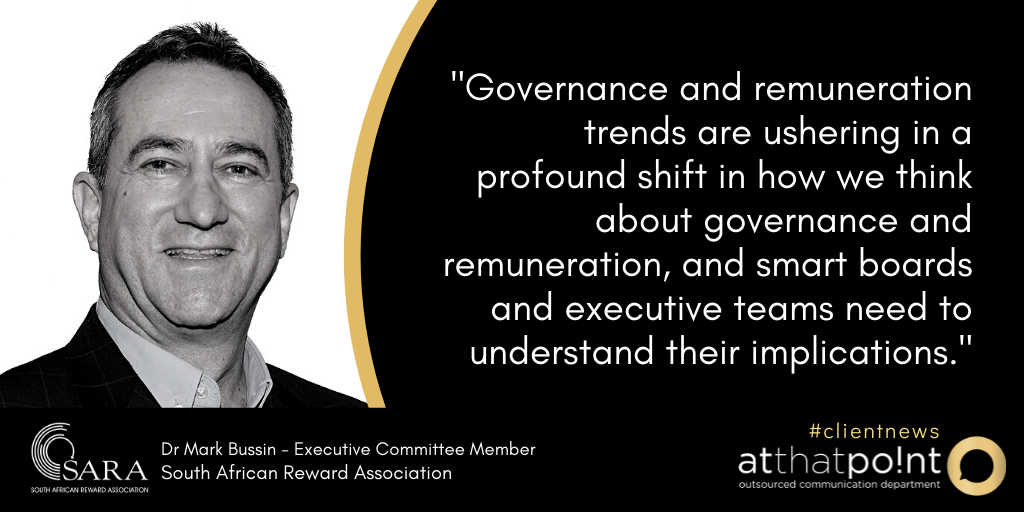
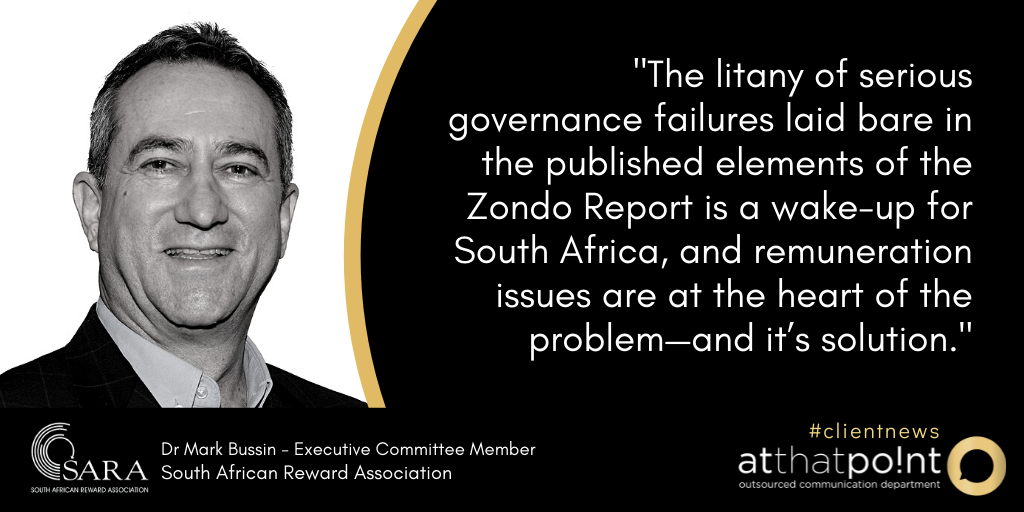
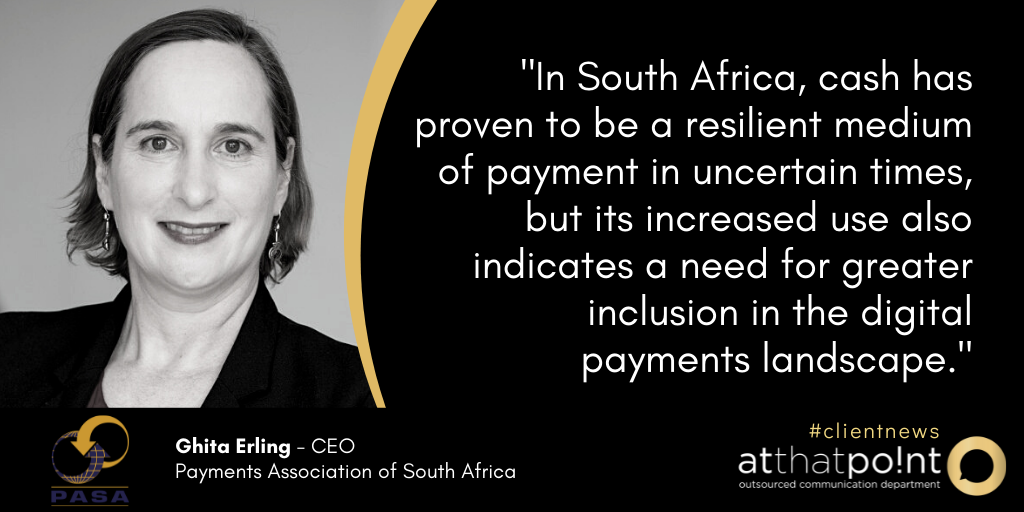
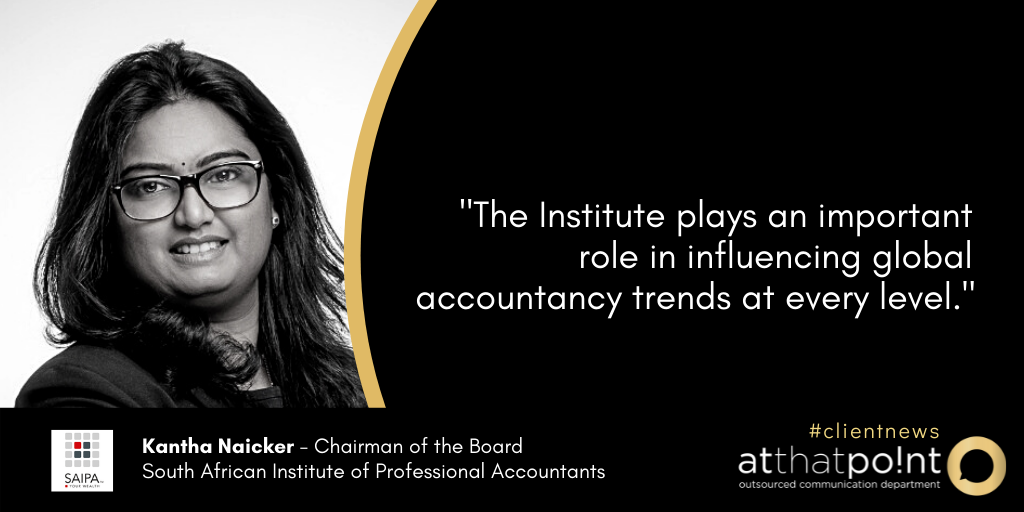
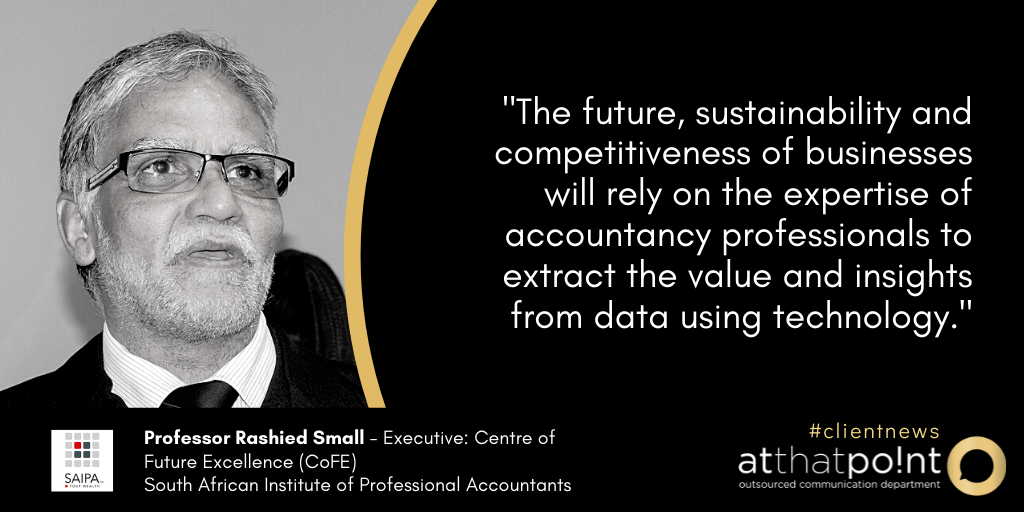
 RSS Feed
RSS Feed